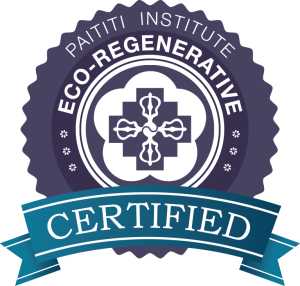
Eco-Regenerative Certification
 How Eco-Regenerative Certified Products by the Paititi Institute for the Preservation of Ecology and Indigenous Culture empowers the world we all live in:
How Eco-Regenerative Certified Products by the Paititi Institute for the Preservation of Ecology and Indigenous Culture empowers the world we all live in:
A lot of damage has been done to the planet over the past few decades, and the difference between “sustainable” and “regenerative” is that sustainable simply doesn’t go far enough. If all we do is sustain what we have now, the healing won’t get done. Regenerative on the other hand; that means enhancing, healing and improving through use. We have a responsibility to heal through our work; to heal the landscapes, heal our communities, heal our water, heal the education and health care systems and truly learn to embody (or remember how to embody) a fully harmonious relationship with mother nature and with each other.
This certification process is from a grassroot NGO with an extensive track record of dedicated and passionate empowerment of indigenous communities. Our impact is largely due to a full immersion approach from living and working at our 4,000 acre land in the Andean mountain region bordering the Peruvian Amazon rainforest that connects us to these communities.
Paititi Institute is part of the new global paradigm within the intentional communities network that brings awareness and support to improve the quality of life, balance of regional bio-diversity, and social development, while working to preserve ethnic identity and cultural heritage.
How does Paititi’s certification bring benefit?
Buying Paititi-certified products ensures compensation for workers and involved community members that’s above Fair Trade standards, both on the individual and collective socio-economic levels. The products are made by organizations dedicated to regenerative living that improves and enhances local environments. This allows native communities to thrive where they live rather than abandoning their homes and falling prey to GMO, mono-crop, logging and mining corporations.
Eco-regenerative certified products are made in farms and forests where water, soil, and wildlife habitat are preserved, where workers are well-treated, where families can access health care and education, and where neighboring communities continuously benefit. Paititi engages in programs such as our Cultural Healing Exchange and ongoing permaculture projects to help facilitate this kind of regenerative work.
Each product sold contributes to ecological restoration and preservation projects of native biodiverse vegetation, food forests, water management and local economy within the native communities.
Why independent, third-party certification is important
Governmental agencies for organic certification are often manipulated and controlled by the agendas of the industrial agriculture complex, often at the expense of small scale native farming communities and their natural environment.
Paititi’s certification is a voluntary way for companies to ensure their practices are responsible and demonstrate to the public that a company’s claims about itself are reliable and verified by an independent, outside party.
In cooperation with other locally-based NGOs and local stakeholders including government, businesses, scientists and academics, the Paititi Institute has developed performance-based standards that balance both social and environmental concerns with economic, technical and cultural realities faced by loggers, farmers, and tourism sectors. Being an independent third-party certifier, the Paititi Institute verifies compliance with these standards, helping to resolve the damaging effects caused by unethical corporate behaviour.
Why does an NGO like the Paititi Institute have a certification?
We created this program because certification is one of the most effective tools for preserving and restoring natural resources while maintaining both the livelihoods and cultural identity of local populations. It offers land users and businesses guidance on how to produce goods and provide services using practical, efficient methods without depleting resources and without negative impacts on the environment or local communities.
In addition, eco-regenerative production means that these products also give back through both preserving and restoring ecological balance. And through the purchase of Eco-Regenerative Certified products, we give people the opportunity to vote with conscious buying decisions that influence a global commitment to sustainability and regenerative businesses.
How do products earn the Eco-Regenerative Certification?
The process begins with a preliminary site visit to determine the changes necessary for Eco-Regenerative certification. Once the product developers meet basic comprehensive standards, a more thorough evaluation against nearly 100 measures by a team from Paititi Institute takes place. Operations that meet the criteria are awarded the Eco-Regenerative Certification seal, demonstrating compliance with the standards. We annually evaluate farms and forests, ensuring continued compliance.
Are Paititi’s standards universal?
The certification standards employed got developed via partnerships with scientists, local NGOs, and government representatives using a process of collaboration that that results in full stakeholder participation. While the standards are universally rigorous, they are adapted to meet regional-specific needs and criteria.






